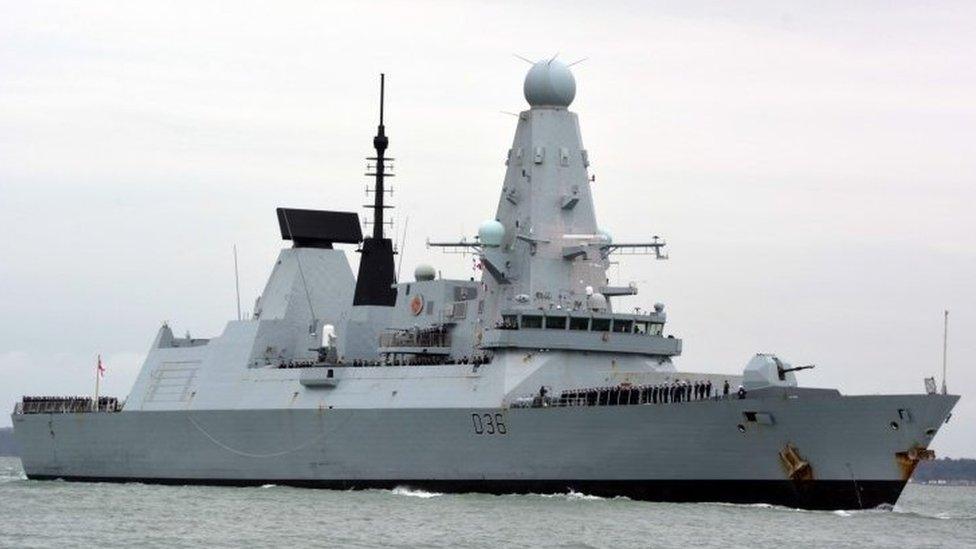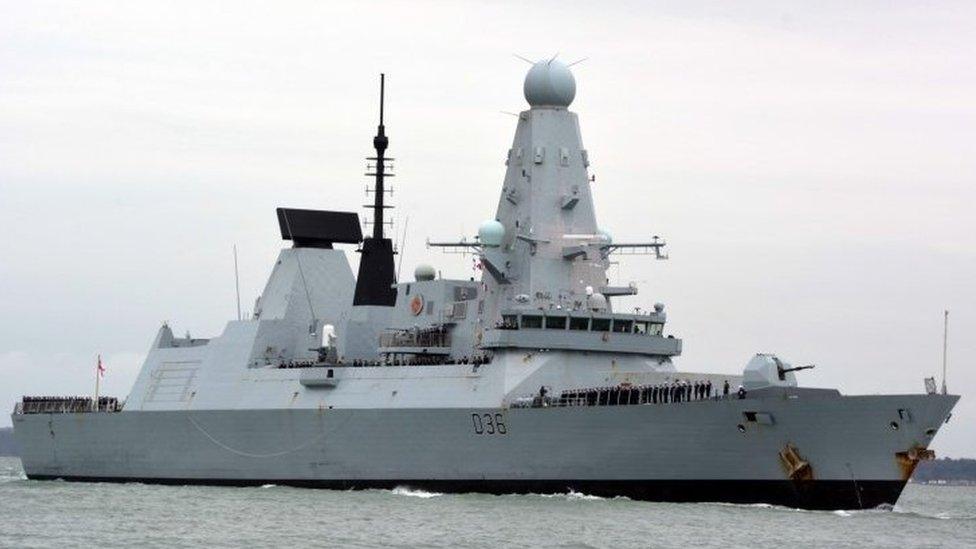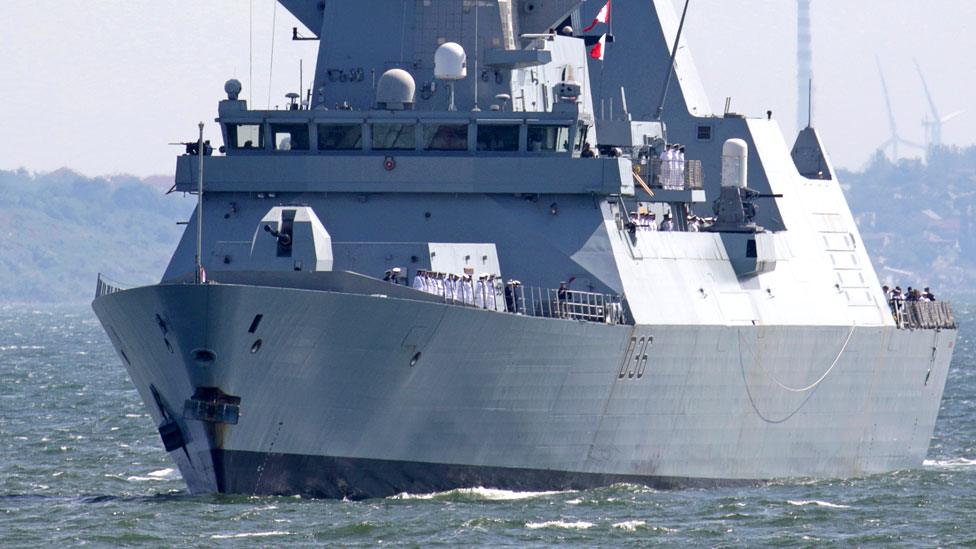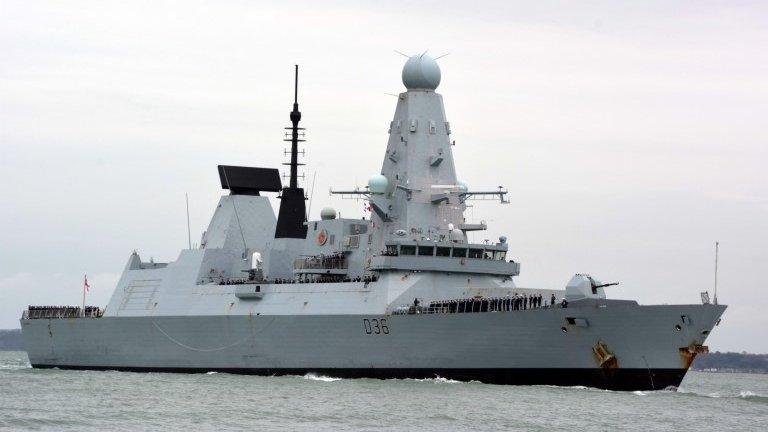Ministry of Defence 'sorry' after secret papers left at bus stop
- Published

Details about HMS Defender and the British military were contained in the documents
The government has said it is carrying out a thorough investigation into how classified defence documents were found at a bus stop in Kent.
Defence minister Jeremy Quin told MPs he was "very sorry" it had happened.
He said it appeared to be a mistake made by a senior official, and the person's access to sensitive material has been temporarily suspended.
The documents - which were handed to the BBC - contained details of HMS Defender and the military.
They were found in a soggy heap behind a bus stop in Kent early on Tuesday morning.
In a statement to the Commons on Monday, Mr Quin said the documents included a paper that was marked "secret UK eyes only".
He said the senior government official had contacted his department to report they were missing on Tuesday.
"This is a mistake, it appears," Mr Quin later added. "I don't want to prejudge the investigation but it appears it was a mistake made by an individual."
"I'm very sorry this incident has happened and the investigation will be thorough."
He added: "While the investigation is being conducted the individual's access to sensitive material has been suspended."
The papers have now been given back to the government and are being assessed to check that none are missing, said Mr Quin.
He said the investigation will look at the actions of the people involved - including the printing of the papers, how the incident was managed once reported and the underlying processes for printing and carrying papers.
The defence minister said he expected the investigation to be completed "shortly" - but that he hoped it could be as little as a week.
And asked whether the UK has told its allies, Mr Quin said: "We have certainly informed the United States."
Mr Quin was also asked whether the investigation will consider whether any official secrets laws were broken by the BBC in reporting on the documents.
"In an ideal and proper world these documents should not have been available where they were so that's where the original fault clearly lies," he replied.
He said he would encourage members of the public to hand in such documents to the police.
"Although I would have preferred naturally the BBC to have handed them over immediately and not made reference to them, they have a job to do. And I recognise that they have behaved responsibly and they have handed the documents back into the department."
One MP, Conservative Bob Stewart, had said he was saddened that the BBC published its report rather than pass the documents straight to the police.

Analysis
By Paul Adams, BBC diplomatic correspondent
MPs are understandably concerned, and in some cases angry, about the loss of such sensitive documents. One even suggested that the senior MoD official responsible for losing them should be made to "walk the plank" for putting the country's military personnel at risk.
It's clear that the breach was significant. Some of the papers were marked "secret" and many were printed on pink paper, indicating the sort of material that should not be removed from the Ministry of Defence except under exceptional circumstances and according to strict procedures.
The investigation, led by the Permanent Secretary at the MoD and involving MoD police, will want to establish whether those procedures were followed and, perhaps, whether they need to be changed.
A former senior government security official told the BBC that taking pink documents out of the MoD was the most "egregious" aspect of this whole affair, but also said that with senior officials working under enormous pressure, provision for them to work securely from home ought to be made possible.
Labour shadow defence secretary, John Healey, asked if there was any danger that espionage may have played a role in the loss of the documents. The minister for defence procurement Jeremy Quin replied that the official had "self-reported" as soon as he realise the documents were missing.
Through our own reporting, the BBC can say with a high degree of confidence that this is not a story of espionage.
But it's still highly concerning. The documents relating to the UK's presence in Afghanistan in the coming months, and how UK forces might work alongside the Americans, are particularly sensitive. The BBC understands the loss has been the subject of frequent conversations with officials in Washington.

Labour's shadow defence secretary John Healey said the incident of the missing documents was embarrassing for the government and also "deeply worrying".
"Ministers need to do more to reassure the public and our forces personnel that they have a grip of their department," he said.
Mr Healey said this was not the first time sensitive documents had gone missing, citing two other examples this year. The minister replied that earlier breaches had not involved such highly classified material.
One set of documents discusses the likely Russian reaction to the passage of British ship HMS Defender through Ukrainian waters off the Crimea coast.
On 23 June more than 20 Russian aircraft and two coastguard ships shadowed the warship as it sailed about 12 miles (19km) off Crimea.
The documents discovered in Kent confirm that passage through a short stretch of water close to the south-west tip of Crimea was a calculated decision by the British government to make a show of support for Ukraine, despite the possible risks involved.
Another of the documents details plans for a possible UK military presence in Afghanistan after the US-led Nato operation there ends.

CLASSIC WIMBLEDON TRADITIONS: Do you know all five and how did they start?
"HE WILL JUST REFUSE TO GET DRESSED": What can you do when your child refuses to go to school?

Related topics
- Published27 June 2021

- Published23 June 2021

- Published23 June 2021
